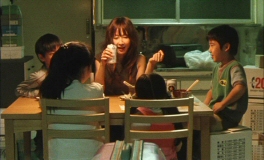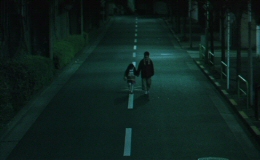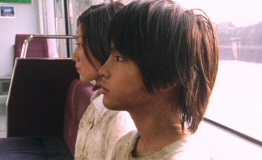Nobody Knows (Hirokazu Kore-eda, 2004)
 Each of Hirokazu Kore-eda’s films that
I’ve seen plunges the viewer into a different sort of emotional stasis. With Nobody
Knows, which is about a group of Japanese children who are abandoned by
their mother and sequestered in an apartment, he examines a group of kids who
are unable to despair because there still exists the faintest glimmer of hope
that their mother will return. Despite this downbeat premise, however, the
director surprisingly focuses on his characters’ momentary pleasures. The
plot, such as it is, is resolutely anti-climatic. Other characters find out
about the children’s predicament, but nothing ever comes of it. Major events
are usually conveyed off-screen. When a character dies, Kore-eda instead directs
our attention to the momentary release of a baseball game that’s occurring
simultaneously. That the emphasis here is placed squarely on the characters’
happiness oddly only further underlines the young ones’ denial of their
constantly worsening situation. These personal, idyllic moments, taken
one-by-one, feel honestly earned, but they deliberately push the audience’s
most pertinent questions about their predicament aside. There exists a fringe
element in the director’s films that he tends to dwell in, making them
somewhat laborious to sit through for the viewer who is unable to settle into
their particular groove. Here, the viewer is placed in an emotional space that
belongs to no one on screen, despite the camera’s physical proximity to the
children. It’s almost as if Kore-eda is trying to objectively display the
children’s subjective responses.
Each of Hirokazu Kore-eda’s films that
I’ve seen plunges the viewer into a different sort of emotional stasis. With Nobody
Knows, which is about a group of Japanese children who are abandoned by
their mother and sequestered in an apartment, he examines a group of kids who
are unable to despair because there still exists the faintest glimmer of hope
that their mother will return. Despite this downbeat premise, however, the
director surprisingly focuses on his characters’ momentary pleasures. The
plot, such as it is, is resolutely anti-climatic. Other characters find out
about the children’s predicament, but nothing ever comes of it. Major events
are usually conveyed off-screen. When a character dies, Kore-eda instead directs
our attention to the momentary release of a baseball game that’s occurring
simultaneously. That the emphasis here is placed squarely on the characters’
happiness oddly only further underlines the young ones’ denial of their
constantly worsening situation. These personal, idyllic moments, taken
one-by-one, feel honestly earned, but they deliberately push the audience’s
most pertinent questions about their predicament aside. There exists a fringe
element in the director’s films that he tends to dwell in, making them
somewhat laborious to sit through for the viewer who is unable to settle into
their particular groove. Here, the viewer is placed in an emotional space that
belongs to no one on screen, despite the camera’s physical proximity to the
children. It’s almost as if Kore-eda is trying to objectively display the
children’s subjective responses.
 Perhaps the goal here is to demonstrate
that just as the children are able to shut out the reality of their situation,
so do those that learn of their circumstances. During the course of the film,
many characters are made aware of their abandonment, thereby nullifying the most
blatant meaning of the title Nobody Knows, but release from their quiet
suffering never arrives. This culpability of the community that should be caring
for the children is never fully articulated, but it permeates, unable to achieve
focus throughout the film. Akira, the eldest of the children, calls his mother
“selfish” at one point, but then backs down when he’s challenged, perhaps
because he realizes she’s the only parent that he has left. Later, he rejects
the money that a young girl offers him when he finds out that she’s gotten it
from “singing Karaoke” with a man (presumably, because it reminds him too
much of his mother, who has abandoned his brood to chase boyfriends), but
subsequently is forced to ask for the cash when his circumstances change. As the
apartment they inhabit grows increasingly more dilapidated, and they begin to
trek outside, but they’re only greeted with the most casual, polite
questioning from strangers.
Perhaps the goal here is to demonstrate
that just as the children are able to shut out the reality of their situation,
so do those that learn of their circumstances. During the course of the film,
many characters are made aware of their abandonment, thereby nullifying the most
blatant meaning of the title Nobody Knows, but release from their quiet
suffering never arrives. This culpability of the community that should be caring
for the children is never fully articulated, but it permeates, unable to achieve
focus throughout the film. Akira, the eldest of the children, calls his mother
“selfish” at one point, but then backs down when he’s challenged, perhaps
because he realizes she’s the only parent that he has left. Later, he rejects
the money that a young girl offers him when he finds out that she’s gotten it
from “singing Karaoke” with a man (presumably, because it reminds him too
much of his mother, who has abandoned his brood to chase boyfriends), but
subsequently is forced to ask for the cash when his circumstances change. As the
apartment they inhabit grows increasingly more dilapidated, and they begin to
trek outside, but they’re only greeted with the most casual, polite
questioning from strangers.
 Throughout, Kore-eda’s
quasi-documentary camerawork is distinctive, frequently conveying all of the
information in a scene through a series of extreme close-ups of his
characters’ feet or hands. This helps to create a fragmentary mood, which does
help somewhat in conveying the passage of time. Though the first forty minutes
of the film explicitly finds the kids abandoned for a period of a month, it
becomes pretty much impossible to guess how much time lapses after that point.
At no point do we see the children complaining, and rarely do they misbehave.
Their obedience becomes almost heartbreaking. Their unquestioning acceptance of
their mother’s rules (she commands them, except Akira, to stay indoors at all
times) and her announcements of her departures is shocking, but Kore-eda hints
at their depression by later showing drawings of her they’ve made or by
focusing on the belongings that she’s left behind. The saddest manifestation
of this tendency occurs when we see the oldest daughter of the clan huddled in
her mother’s closet, among her things. A brief shot that conveys a breadth of
emotion, it justifies the director’s pared-down approach. Like Kore-eda’s
Distance, the muted Nobody Knows is more concerned with the
aftereffects of a given trauma than the more histrionic moments of shock, and as
in that film he’s less interested in catharsis than the long process that
takes place before it’s achieved.
Throughout, Kore-eda’s
quasi-documentary camerawork is distinctive, frequently conveying all of the
information in a scene through a series of extreme close-ups of his
characters’ feet or hands. This helps to create a fragmentary mood, which does
help somewhat in conveying the passage of time. Though the first forty minutes
of the film explicitly finds the kids abandoned for a period of a month, it
becomes pretty much impossible to guess how much time lapses after that point.
At no point do we see the children complaining, and rarely do they misbehave.
Their obedience becomes almost heartbreaking. Their unquestioning acceptance of
their mother’s rules (she commands them, except Akira, to stay indoors at all
times) and her announcements of her departures is shocking, but Kore-eda hints
at their depression by later showing drawings of her they’ve made or by
focusing on the belongings that she’s left behind. The saddest manifestation
of this tendency occurs when we see the oldest daughter of the clan huddled in
her mother’s closet, among her things. A brief shot that conveys a breadth of
emotion, it justifies the director’s pared-down approach. Like Kore-eda’s
Distance, the muted Nobody Knows is more concerned with the
aftereffects of a given trauma than the more histrionic moments of shock, and as
in that film he’s less interested in catharsis than the long process that
takes place before it’s achieved.
63
09.19.05
Jeremy Heilman